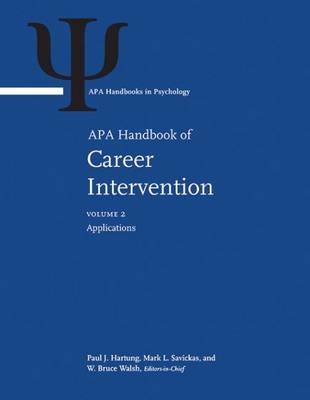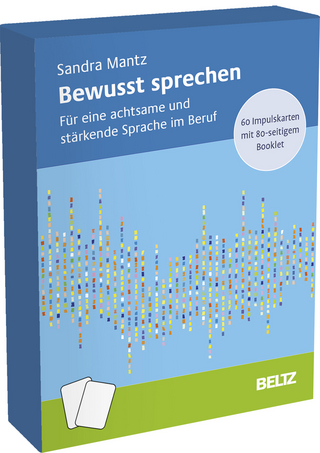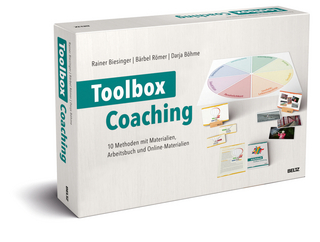
APA Handbook of Career Intervention
American Psychological Association
978-1-4338-1753-3 (ISBN)
- Titel z.Zt. nicht lieferbar
- Versandkostenfrei innerhalb Deutschlands
- Auch auf Rechnung
- Verfügbarkeit in der Filiale vor Ort prüfen
- Artikel merken
The two-volume APA Handbook of Career Intervention aims to consolidate and advance knowledge about the scientific foundations and practical applications of career intervention. It offers an inclusive resource for understanding and applying principles and practices of career intervention to assist diverse individuals and groups across developmental stages to construct personally meaningful and socially relevant work lives.
The handbook presents information about the historical, contemporary, theoretical, demographic, assessment-based, and professional foundations of career intervention (Volume 1), as a well as specific career intervention models, methods, and materials within each career service noted above and applied to easing career transitions (Volume 2).
In whole or in part, the Handbook aims to be useful to researchers, practitioners, educators, consultants, policy-makers, and students alike across a full array of professions including psychology, counseling, education, and business and industry.
Paul J. Hartung, PhD, is a professor of family and community medicine at Northeast Ohio Medical University and adjunct professor of counseling at the University of Akron. He has authored more than 75 journal articles and book chapters and edited two books dealing with career development, assessment, and counseling. He is the current editor of The Career Development Quarterly and also serves on several editorial boards including the Journal of Vocational Behavior, Journal of Career Assessment, and Journal of Counseling and Development. He is a fellow of APA Division 17 (Society of Counseling Psychology) and the National Career Development Association. In 2009, he received the APA Division 17 John L. Holland Award for Outstanding Achievement in Career and Personality Research. He currently serves as U.S. national liaison to the International Association of Applied Psychology (IAAP Division 16, Division of Counseling Psychology). Mark L. Savickas, PhD, is professor of family and community medicine at the Northeast Ohio Medical University and adjunct professor of counselor education at Kent State University. He is president of International Association of Applied Psychology (IAAP) Division 16 (Division of Counseling Psychology; 2011–2014) and serves as a visiting professor at the University of Pretoria (South Africa; 2012–2014) and at the Institute for Employment Research at Warwick University (United Kingdom; 2013–2016). His 80 articles, 40 book chapters, and 500 presentations to professional groups have dealt with vocational behavior and career counseling. He edited The Career Development Quarterly (1991–1998) and is currently editor of the Journal of Vocational Behavior (1999–present). He received the APA Division 17 (Society of Counseling Psychology) John Holland Award for Outstanding Achievement in Career and Personality Research (1994) and the Leona Tyler Award for Distinguished Contributions in Counseling Psychology (2011). In 1996, he received the Eminent Career Award from the National Career Development Association. He is a fellow of the American Counseling Association, APA, Association for Psychological Science, and National Career Development Association. He has received honorary doctorates from the University of Lisbon (Portugal) and the University of Pretoria (South Africa). W. Bruce Walsh, PhD, is a professor emeritus in the Department of Psychology at The Ohio State University. He is the founder and charter editor of the Journal of Career Assessment. He has coauthored and coedited 24 books and 150 journal articles. In 1998, he served as president of APA Division 17 (Society of Counseling Psychology) and in 2010 as president of APA Division 34 (Society for Environmental, Population and Conservation Psychology). From 1990 to 2002 he served as the director of training for the Counseling Psychology Program at Ohio State. In 2004, he received the Leona Tyler Award for Distinguished Contributions in Counseling Psychology from APA Division 17 in recognition of outstanding accomplishments. In 2011, he received the W. James Cossé Distinguished Service Award from the American Academy of Counseling Psychology for extraordinary contributions to scholarly research and the professional practice of counseling psychology. He holds fellow status in APA and Association for Psychological Science, and is licensed as a psychologist in Ohio.
Volume 1: Foundations
Editorial Board
About the Editors-in-Chief
Contributors
Series Preface
Introduction
Part I: Past and Prologue
Chapter 1: Career Intervention: From the Industrial to the Digital Age
Mark Pope
Chapter 2: Contemporary Conceptualizations of Career
Kerr Inkson
Chapter 3: Career Counseling Process and Outcome
Susan C. Whiston and Ciemone S. Rose
Chapter 4: Career Intervention Efficacy: Making a Difference in People's Lives
Steven D. Brown
Part II: Theoretical Perspectives
Chapter 5: Person–Environment Fit
Rong Su, Chris Murdock, and James Rounds
Chapter 6: Life Span Career Development
Susan D. Phillips
Chapter 7: A Social Cognitive Perspective on Career Intervention
Hung-Bin Sheu and Robert W. Lent
Chapter 8: Career Counseling Paradigms: Guiding, Developing, and Designing
Mark L. Savickas
Chapter 9: Relationships and Career Development: An Integrative Approach
Hanoch Flum
Chapter 10: Environments: Diversity in Theoretical Foundations of Career Intervention
ZiYoung Kang and Gary D. Gottfredson
Part III: Demographic Considerations
Chapter 11: Children and Adolescents
Justin C. Perry and Eric W. Wallace
Chapter 12: Women, Men, and Change: The Role of Career Interventions
Mary J. Heppner and Ae-Kyung Jung
Chapter 13: Career Interventions With Racial and Ethnic Minority Clients
Frederick T. L. Leong and Lisa Y. Flores
Chapter 14: Social Class and Career Intervention
David L. Blustein, Saliha Kozan, Alice Connors-Kellgren, and Bailey Rand
Chapter 15: Immigrant Workers: Career Concerns and Barriers
Donna E. Schultheiss and Brittan L. Davis
Part IV: Assessment
Chapter 16: Meaning, Measurement, and Assessment of Vocational Interests for Career Intervention
Sandro M. Sodano
Chapter 17: Intellectual Abilities for Counseling Interventions, Practice, and Theory: Dismissing Their Significance for Learning and Work Constitutes Malpractice
Harrison J. Kell and David Lubinski
Chapter 18: Personality Assessment and Career Interventions
Jérôme Rossier
Chapter 19: Process Variables: Maturity, Identity, Decision-Making, and Adjustment
Peter A. Creed and Michelle Hood
Part V: Professional Context
Chapter 20: Training and Supervision in Career Counseling
Nicholas Ladany and Tiffany O'Shaughnessy
Chapter 21: Standards, Competencies, and Guidelines in Career Interventions
Cindy L. Juntunen and Erin L. Martin
Chapter 22: Psychotherapy, Counseling, and Career Counseling
Peter McIlveen
Chapter 23: Professional Development: Who We Are and What We Do
Jane Goodman and Mary L. Anderson
Index
Volume 2: Applications
Editorial Board
Part I: Guiding
Chapter 1: Test Interpretation: Talking With People About Their Test Results
Donald G. Zytowski
Chapter 2: Person Matching for Career Exploration and Choice
Stephanie T. Burns
Chapter 3: Integrative Approaches to Career Intervention
Patrick J. Rottinghaus and Alec J. Eshelman
Chapter 4: Using Holland's Theory to Assess Environments
ZiYoung Kang and Gary D. Gottfredson
Chapter 5: Using Information and Communication Technology in Delivering Career Interventions
James P. Sampson Jr. and Debra S. Osborn
Chapter 6: Card Sorts, Sentence Completions, and Other Qualitative Assessments
Robert C. Chope
Chapter 7: Academic Advising
Leigh S. Shaffer
Part II: Developing
Chapter 8: Enhancing Future Time Perspective and Exploring Occupational Possible Selves
Brian J. Taber
Chapter 9: Assessing Children: Interests and Personality
Terence J. G. Tracey and Sandro M. Sodano
Chapter 10: Promoting Interest in and Entry Into Science, Technology, Engineering and Mathematics Careers
Marie F. Shoffner and Donna J. Dockery
Chapter 11: Vocational Rehabilitation Counseling
Phillip D. Rumrill Jr. and Lynn C. Koch
Chapter 12: Fostering Career Exploration
Raysen Cheung
Chapter 13: Self-Efficacy Beliefs
Mindi N. Thompson and Stephanie R. Graham
Chapter 14: Measuring and Assessing Career Maturity and Adaptability
Kevin Glavin
Chapter 15: Making Better Career Decisions
Itamar Gati and Nimrod Levin
Chapter 16: Leisure
Howard E. A. Tinsley and Diane J. Tinsley
Part III: Designing
Chapter 17: Life Themes and Narratives
J. G. Maree
Chapter 18: Identity Development
Alan Brown and Jenny Bimrose
Chapter 19: Using Audience to Foster Self-Narrative Construction and Career Adaptability
Jennifer J. Del Corso and Hande Sensoy Briddick
Chapter 20: Thinking About Vocational Choice
Emily Bullock-Yowell, Denise E. Saunders, and Gary W. Peterson
Chapter 21: Practical Career Counseling Applications of the Happenstance Learning Theory
John D. Krumboltz
Chapter 22: Using Metaphor in Career Intervention
Norman E. Amundson
Chapter 23: Strategies for Discerning and Living a Calling
Bryan J. Dik and Ryan D. Duffy
Part IV: Placing
Chapter 24: Evidence-Based Job Search Interventions for Unemployed Workers and Youth
Jukka Vuori and Richard H. Price
Chapter 25: Employability
Andrew T. Rothwell
Chapter 26: Networking
Susan Shortland
Chapter 27: Understanding Postsecondary Options: Guiding the Decision-Making Process
Mark A. Kretovics and Tracy M. Lara
Part V: Coaching
Chapter 28: Mentoring in Postsecondary Education and Organizational Settings
Lillian T. Eby and Erin Dolan
Chapter 29: Coaching
Jesse Segers, Nicky Dries, and Dirk Versées
Chapter 30: The Synergy Project: A Group Career Counseling Intervention to Enhance Work–Family Management
Rachel Gali Cinamon
Chapter 31: Top-Down and Bottom-Up Interventions to Increase Work Engagement
Arnold B. Bakker
Chapter 32: Promoting the Work Adjustment of Late-Career Employees
Barbara Griffin
Chapter 33: Job Satisfaction, Job Performance, and Success
Donald E. Eggerth
Part VI: Transitioning
Chapter 34: Individualized Career Plans: Helping Youth Create Successful School-to-Work Transitions
Chris Wood and Heather Dahl
Chapter 35: Emerging Adult Career Transitions
José F. Domene, Jeffrey Landine, and John Stewart
Chapter 36: Facilitating Midcareer Transitions
Michael E. Hall and Barbara H. Suddarth
Chapter 37: Fostering Career Management Using Career Anchor Theory
Jared R. Chapman
Chapter 38: Consultation in Litigation
Michael Shahnasarian
Chapter 39: Career Interventions: Retirement
Joanne K. Earl, Alexa Muratore, Cindy Leung, and Tin Wei Yu
Index
| Erscheint lt. Verlag | 30.12.2014 |
|---|---|
| Reihe/Serie | APA Handbooks in Psychology® Series |
| Verlagsort | Washington DC |
| Sprache | englisch |
| Maße | 216 x 279 mm |
| Themenwelt | Geisteswissenschaften ► Psychologie ► Arbeits- und Organisationspsychologie |
| Sozialwissenschaften ► Pädagogik ► Berufspädagogik | |
| Sozialwissenschaften ► Soziologie | |
| Wirtschaft ► Betriebswirtschaft / Management ► Personalwesen | |
| ISBN-10 | 1-4338-1753-5 / 1433817535 |
| ISBN-13 | 978-1-4338-1753-3 / 9781433817533 |
| Zustand | Neuware |
| Informationen gemäß Produktsicherheitsverordnung (GPSR) | |
| Haben Sie eine Frage zum Produkt? |
aus dem Bereich


